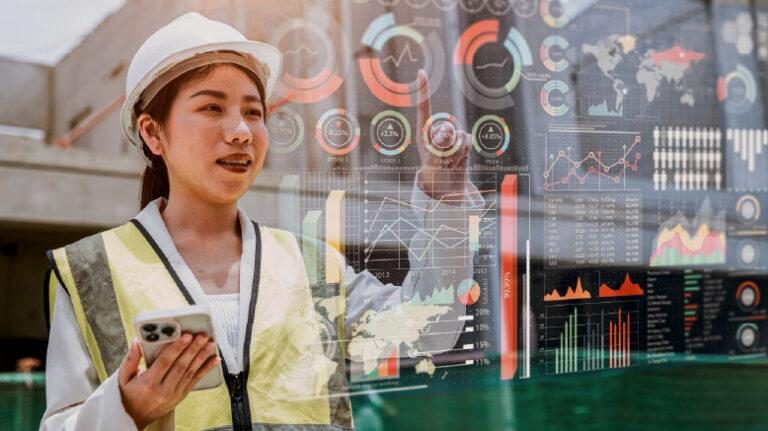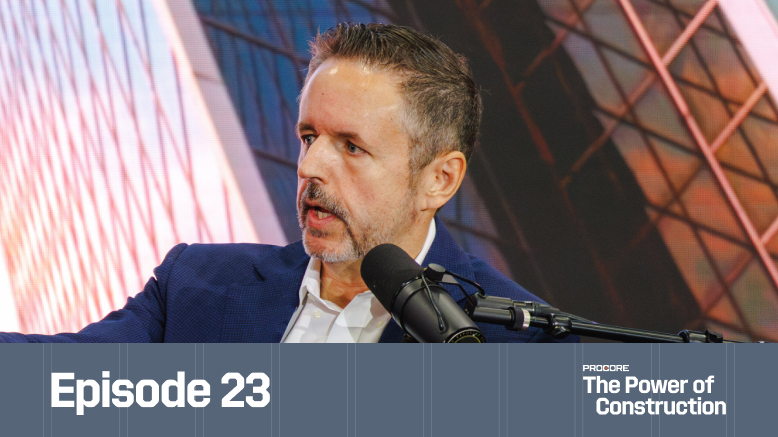— 5 min read
How AI is Redefining Efficiency & Safety in Civil Construction


Last Updated Sep 23, 2025

Alex Six
Solution Specialist, C&I Industry Specialist
16 articles
Alex Six is an Enterprise & Strategic Civil & Infrastructure Overlay Account Executive for Procore. Alex has a long background in the construction industry beginning with an internship with one of the biggest contractors in the world, and expanding across projects with teams as small as 4 people and as large as multi-billion dollar budgets with large teams and disciplines. His resume includes Caltrans highways & bridges, Metro light rail & underground, as well as airport runways and utilities.

Marlissa Collier
34 articles
Marlissa Collier is a journalist whose work focuses on the intersections of business, technology, policy and culture. Her work has been featured in digital and print formats with publications such as the Dallas Weekly, XO Necole, NBCU Comcast, the Dallas Nomad, CNBC, Word in Black and Dallas Free Press. Marlissa holds an undergraduate degree in Construction Engineering from California State University, Long Beach and an MBA from Southern Methodist University’s Cox School of Business.
Last Updated Sep 23, 2025

As demand for new and modernized infrastructure surges, the civil construction industry faces an imperative to deliver projects with unprecedented speed, precision and safety. Emerging at the forefront of this evolution is artificial intelligence (AI), a technology actively reshaping how roads are built, bridges are strengthened and cities are connected.
AI's integration into civil construction operations marks a significant leap forward from traditional methods, offering capabilities that are fundamentally altering project planning, execution and risk management. One of the most immediate and impactful applications of AI lies in its ability to generate highly efficient operational plans. This article looks into how AI is creating new standards for efficiency, safety and more — helping civil construction projects run smoothly.
AI's speed and comprehensiveness in data analysis are unparalleled. It can process vast amounts of information and present actionable scenarios in a second. Where traditional methods might take hours or days to optimize a schedule, AI can play around with all the variables and literally summarize the top four options, providing invaluable scenarios based on the data you're looking for. Its ability to consume data and offer precise, tailored solutions is truly invaluable.

Alex Six
Solution Specialist, C&I Industry Specialist
Procore Technologies
Table of contents
How AI Revolutionizes Project Planning
One of the most immediate and impactful applications of AI lies in its ability to generate highly efficient operational plans.
Historically, developing comprehensive schedules, optimizing crew sizes and determining equipment needs has been a laborious, time-consuming process, relying heavily on individual experience and manual data analysis.
AI can provide baseline efficiency plans within seconds, analyzing vast datasets of past projects, industry benchmarks and real-time conditions to propose optimal resource allocation and production rates. This dramatically reduces preconstruction planning time and establishes a higher standard of accuracy and foresight, directly contributing to improving efficiency and productivity from the outset.
AI can analyze past trends instantly, providing a baseline for optimal efficiency. Where a foreman and superintendent might spend hours evaluating crew sizes and material needs based on experience and site accessibility, AI can generate these insights in seconds. It offers a powerful starting point for the most efficient way to build, which human experts can then refine and adapt.
Alex Six
Solution Specialist, C&I Industry Specialist
Procore Technologies
Beyond initial planning, AI's analytical prowess extends to ongoing project management. By continuously processing data from various sources — including progress reports, equipment telemetry and even external environmental factors — AI can dynamically adjust daily and weekly schedules for maximum efficiency.
This constant optimization minimizes idle time so materials and equipment are where they need to be when they're needed and helps project managers proactively address potential bottlenecks before they escalate into costly delays. The ability to identify trends and predict future needs allows for more agile and responsive project execution — an important factor in the complex and often unpredictable environment of civil construction.
Free AI in Construction Course with Hugh Seaton
Start learning today with industry expert Hugh Seaton and discover how AI can boost efficiency, reduce risk, and transform your projects.

How AI Enhances Safety
One of the most compelling advantages AI offers is in enhancing project safety, a critical component of mitigating risk and loss. Traditional job hazard analyses, while essential, are inherently limited by human capacity to observe and process information. AI-powered safety tools can integrate with various data streams to identify potential hazards that might otherwise be overlooked.
Safety tools powered by AI can go far beyond traditional methods. While a manual safety assessment might cover obvious hazards, AI integrates countless external factors. For instance, an AI system could flag that a nearby middle school dismisses at 3 PM, creating a sudden influx of pedestrians near a jobsite – a hazard you might not consider until it happens. AI factors in so many more variables than a human ever could, anticipating risks before they become problems.
Alex Six
Solution Specialist, C&I Industry Specialist
Procore Technologies
Imagine an AI system considering not only onsite equipment movements but also external factors like nearby school dismissal times, which could lead to increased pedestrian or vehicular traffic near a jobsite.
This level of predictive analysis moves beyond a reactive "lessons learned" approach, allowing for the proactive implementation of safety measures that can prevent incidents before they occur. The potential to anticipate and mitigate risks before they materialize represents a paradigm shift in how safety is managed on civil construction sites, safeguarding both personnel and project timelines.
AI is transformative — but it still isn't human.
While the transformative power of AI is undeniable, industry leaders emphasize the importance of maintaining a balance between AI-driven insights and human oversight. AI provides unparalleled data analysis and intelligent suggestions, but critical decisions — particularly those with significant financial or safety implications — still require human review and approval.
The goal is not to replace human expertise but to empower it, streamlining administrative tasks and providing project teams with superior data-driven baselines so they can focus their valuable craft skills and judgment on core construction activities. This collaborative approach ensures accuracy and accountability in the judicious application of AI's capabilities.
The integration of AI also presents a unique opportunity for building healthy people and cultures within the civil construction industry. The younger workforce, inherently more receptive to technology, is embracing AI tools with enthusiasm. This receptiveness can be a powerful recruitment tool, attracting new talent to an industry that has historically faced workforce shortages.
AI isn't here to take your job, but someone who knows how to use AI better than you will. That's because they'll be faster, quicker with their decision-making and simply more efficient. Think of AI as an exoskeleton for the human mind — it empowers people to become almost superhuman. You can accomplish tasks 10, even 20 times faster than was possible just five or ten years ago.
Alex Six
Solution Specialist, C&I Industry Specialist
Procore Technologies
A New Cornerstone of Civil Construction
Beyond the capabilities discussed above, AI's potential applications extend to sustainability and efficiency. AI can analyze material properties and project specifications to identify opportunities for reusing materials like concrete, significantly reducing waste.
Its ability to process vast amounts of environmental data can aid in better understanding and mitigating impacts related to deforestation, wildlife and climate patterns. Improved weather prediction capabilities, powered by AI, lead to better project planning and reduced downtime, while optimization of waste management and energy systems on sites contribute to more environmentally responsible construction practices.
AI is not merely an add-on but an intrinsic component of the future of civil construction. By enhancing efficiency across all phases, significantly improving safety protocols and empowering a more skilled and technologically adept workforce, AI is poised to drive greater productivity and mitigate risk. The judicious adoption and integration of AI, balanced with invaluable human expertise, will be a big factor in shaping the resilient infrastructure and thriving communities of tomorrow.
Was this article helpful?
Thank you for your submission.
0%
0%
You voted that this article was . Was this a mistake? If so, change your vote
Scroll less, learn more about construction.
Subscribe to The Blueprint, Procore’s construction newsletter, to get content from industry experts delivered straight to your inbox.
By clicking this button, you agree to our Privacy Notice and Terms of Service.
Thank you!
You’re signed up to receive The Blueprint newsletter from Procore. You can unsubscribe at any time.
Categories:
Written by

Alex Six
Solution Specialist, C&I Industry Specialist | Procore Technologies
16 articles
Alex Six is an Enterprise & Strategic Civil & Infrastructure Overlay Account Executive for Procore. Alex has a long background in the construction industry beginning with an internship with one of the biggest contractors in the world, and expanding across projects with teams as small as 4 people and as large as multi-billion dollar budgets with large teams and disciplines. His resume includes Caltrans highways & bridges, Metro light rail & underground, as well as airport runways and utilities.
View profile
Marlissa Collier
34 articles
Marlissa Collier is a journalist whose work focuses on the intersections of business, technology, policy and culture. Her work has been featured in digital and print formats with publications such as the Dallas Weekly, XO Necole, NBCU Comcast, the Dallas Nomad, CNBC, Word in Black and Dallas Free Press. Marlissa holds an undergraduate degree in Construction Engineering from California State University, Long Beach and an MBA from Southern Methodist University’s Cox School of Business.
View profileExplore more helpful resources

Who Owns Construction’s Intelligence?
In this episode of The Power of Construction, we chat with Hugh Seaton, CEO of The Link.ai, to step past the buzz around tools and features and unpack what true...

AI With Intent: How Construction Leaders Are Building Trust in Emerging Tech
AI’s potential in construction is enormous — but with this still mostly untapped potential comes an immense amount of risk, that is, if this powerful tool is implemented carelessly. While...

How Close Are We to Bridging the Design-Build Divide?
For decades, construction decisions have often been made based on gut instinct. But what if the real barrier to transformation isn’t technology—it’s the divide between design and construction? In episode...

Building Intelligence: How AI & Data Are Rewiring Construction for the Digital Age
As data center construction surges to meet the demands of AI, cloud computing, weekend streaming binges and real-time digital services, the pressure being put on builders by owners has reached...
Free Tools
Calculators
Use our calculators to estimate the cost of construction materials for your next project.
Templates
Find a template to help you with your construction project tasks.
Material Price Tracker
Get the latest U.S. retail prices and view historical trends for common building materials.
Glossary
Explore key terms and phrases used in the industry.
